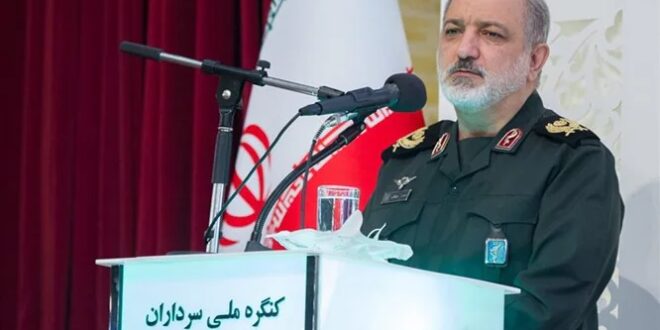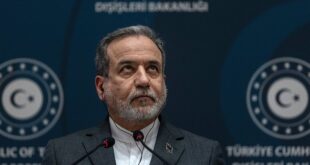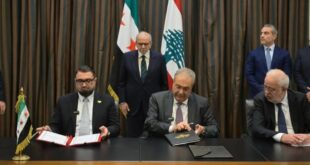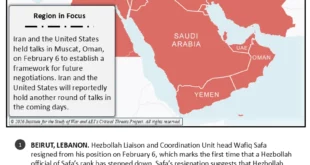Introduction
Since Iran’s April 14, 2024 drone and missile attack on Israel, named “True Promise,” by the Iranian regime, and against the backdrop of statements by International Atomic Energy Agency (IAEA) director general Rafael Grossi that Iran is “weeks rather than months” away from having enough enriched uranium to develop a nuclear bomb, [1] Iranian regime officials, particularly those from the Islamic Revolutionary Guards Corps (IRGC), have stepped up their warnings of coming Iranian nuclear breakout, that is, production of a nuclear bomb.
The open and explicit discussion of this issue seems to herald a change in Iran’s nuclear policy, and is aimed at getting the public, in Iran and in the international community, accustomed to the idea that an Iranian nuclear weapon is no longer taboo.
Hints, and even warnings, that Iran will be changing its declared nuclear doctrine from civilian to military, and will act to develop nuclear weapons, have come from the following officials: IRGC Brig. Gen. Ahmad Haq Taleb, who is in charge of security for Iran’s nuclear facilities; Javad Karimi Ghadossi, a member of the National Security Committee in the Majlis; Abdallah Ganji, a member of the government’s informational council; Saeed Lilaz, reformist activist who served as advisor to Iranian President Mohammad Khatami (1997-2005); and Mahmoud Reza Aghamiri, president of Beheshti University who is himself a nuclear scientist. Also issuing these hints and warnings were various Iranian media outlets.
On April 15, the moderate conservative website Asr-e Iran acknowledged that Iran has the capability to produce a nuclear warhead and warned that it would do so and would use it in its next missile attack on Israel. Abdallah Ganji, the member of the Iranian government’s informational council, explained on April 16 in an article in the IRGC-affiliated Javan daily that Iran was in a direct war against the Western nuclear powers and that the smallest mistake on their part could prompt Iran to change its nuclear program.
On April 18, IRGC Brig. Gen. Ahmad Haq Taleb, who is in charge of securing Iran’s nuclear facilities, had warned that Iran would rethink its nuclear doctrine – that is, it would act to produce a nuclear weapon if there was a threat from Israel.
Then, several hours after Iranian Foreign Ministry spokesman Nasser Qan’ani announced, in an effort to reassure the West, that “nuclear weapons have no place in Iran’s defensive doctrine,”[2] Majlis National Security Committee member Javad Karimi Ghadossi tweeted in Farsi on April 22 that “if approval is given [by Iranian Supreme Leader Ali Khamenei], it will be a week until the first [nuclear] test.”
To date, regime officials have frequently mentioned the nonexistent nuclear fatwa attributed to Supreme Leader Khamenei that they say bans the production of nuclear weapons (see Appendix II: MEMRI Reports On The Nonexistent Nuclear Fatwa). This has been in order to lay to rest the international community’s fears about Iran’s development of its nuclear program. In recent days, several officials, among them Beheshti University president and nuclear scientist Mohammad Reza Aghamiri, have told Iran’s Channel 2 TV that Khamenei can change this fatwa at any time.
All this is in addition to statements by American Iranian Council (AIC) founder and president and Rutgers University professor Hooshang Amirahmadi,[3] who unsuccessfully ran for president of Iran in 2005, 2013, and 2017. He said that Iran must change its declaration that Islam bans nuclear weapons and instead declare that it does not ban them, and that it should produce them as its only deterrence against Israel.
Another notable claim made by several officials who have called for developing nuclear weapons is that Iran has the right to defend itself. The premise is that although Iran attacked Israel, the world considers this a defensive move. That is, Iran views its offensive move as defensive after Israel’s April 1 attack on IRGC officials in Damascus, from there considers that it is entitled to respond by changing its nuclear strategy from civilian to military.
It should be noted that this claim in statements by Iranian officials justifying the Iranian regime’s development and possession of nuclear weapons as a defensive response was already raised when President Biden took office in January 2021, particularly in the context of the impasse in the nuclear negotiations with the U.S. in August 2022. (see Appendix I: Iranian Officials Call For Obtaining And Producing Nuclear Weapons – MEMRI TV Clips And Reports 2021-22.)
Then too, Iranian spokesmen described a situation in which Iran’s development of nuclear weapons was a defensive response to a possible attack on Iran, or that it would officially serve as compensation for additional future U.S. violations of the JCPOA nuclear agreement. By “violations,” they meant another U.S. withdrawal from the agreement if it reentered it, or in the event that the U.S. reneged on any economic commitments it would make to Iran. (See MEMRI Inquiry and Analysis No. 1648, Shift In Iranian Regime Statements On Nuclear Weapons: Regime Spokesmen Talk Openly About Them, Aiming For Western Acquiescence To Iran As A Nuclear Threshold State, August 2, 2022.
The proliferation of these messages from so many Iranian sources within a short span of time calling for producing nuclear weapons for “self defense” indicate a new line of policy, decided in advance and supported by Iran’s leadership. This report will review the Iranian regime’s warnings of coming nuclear breakout by the Iranian regime:
Javad Karimi Ghadossi, Majlis National Security Council Member And Former Senior IRGC Official: “If Approval Is Given [By Iranian Supreme Leader Ali Khamenei], It Will Be A Week Until The First [Nuclear] Test”
On April 22, 2024, Javad Karimi Ghadossi, Majlis National Security Council member and former senior IRGC official, warned that Iran would carry out a nuclear test within a week of Supreme Leader Ali Khamenei’s order to do so. The following is his post on X:
“If approval is given [by Iranian Supreme Leader Ali Khamenei], it will be a week until the first [nuclear] test. #Iranian_Might”
IRGC Brig. Gen. Ahmad Haq Taleb, In Charge Of Securing Iran’s Nuclear Facilities: “It Would Be Reasonable To Change Iran’s Nuclear Doctrine And Policy And To Deviate From The Considerations Declared In The Past”
The day before the April 18 attack on Iran’s air defense systems near the nuclear facilities in Isfahan, that is attributed to Israel, IRGC Brig. Gen. Ahmad Haq Taleb, who is in charge of securing Iran’s nuclear facilities, discussed a possible Israeli operation in response to Iran’s “True Promise” drone and missile attack on Israel several days previously. He stressed that it was reasonable for Iran to now change its nuclear doctrine from civilian to military – that is, to direct its program towards nuclear weapons and away from peaceful purposes – and warned that Iran would attack Israel’s nuclear facilities if Israel attacked Iran. He said:
“These [Israeli] threats did not originate today, or yesterday. Beginning years ago, the false Zionist regime engaged, in addition to threats, in sabotage and terrorism against the [Iranian] state’s nuclear industry. Despite the international protocols and regulations, and the IAEA’s rules and regulations, all countries refrained from attacking nuclear facilities. At the same time, Iran was always, from the beginning, ready to tackle these [Israeli] threats.
“Recently, the Zionist regime violated all the international laws and regulations, by attacking the consular department of the Iranian Embassy in Syria, and it is unacceptable for it to threaten to again attack our country’s nuclear facilities, in another act of desperation,. We are ready to deal with any Zionist regime threat with air defense systems and very advanced facilities and equipment, as well as by having decentralized our country’s nuclear facilities across our vast country.
“Iran’s armed forces are on full alert. The Zionist enemy’s nuclear facilities are known, and we have the required information about all the targets. Our finger is on the trigger to fire powerful missiles to destroy the noted targets, in order to respond to any possible operation on their part.
“If the Zionist regime wishes to act against our nuclear centers and facilities, it will absolutely face our response, and, on the [principle of] an eye for an eye, we will attack its nuclear centers with advanced weapons. If the false Zionist regime wants to threaten to attack our country’s nuclear centers, as a way of pressuring Iran, it would be reasonable to change Iran’s nuclear doctrine and policy and to deviate from the considerations declared in the past [from civilian to military].
“If the Zionist regime carries out an aggressive act against Iran, the Iranian army’s armed forces will be responsible for responding. They should be certain that the blow against them by [Iran’s] armed forces will go down in history just like True Promise did.
“We promise the dear and honorable people of Iran that your revolutionary sons in the IRGC, in the zealous and strong army of Iran, and in the country’s security forces are defending the nuclear facilities, centers, and sites in the country, using air defense systems and the most advanced defense and security equipment, such that our country’s nuclear centers are absolutely secure.”[4]
Abdallah Ganji, Government Informational Council Member, In IRGC-Affiliated Javan Daily: “Any Mistake By Israel And Its Sponsors – France, Britain, And The U.S. – Could Prompt Iran To Rethink Its Nuclear Strategy”
In an April 16, 2024 article in the IRGC-affiliated Javan daily, Abdallah Ganji, a member of the government’s informational council, stated that Iran, whose might against the U.S., Britain, and France was revealed in the April 14 drone and missile attack on Israel, was in a direct war against the Western nuclear powers. Warning that the smallest mistake on the latter’s part “could prompt Iran to rethink its nuclear strategy,” that is, to develop nuclear weapons, he stated that even though it was Iran that attacked Israel, the world considers this a defensive move. That is, Iran views its offensive move as defensive, and from there considers that it is entitled to change its nuclear strategy from civilian to military in self defense.
The following are the main points of Ganji’s article in Javan:
“…An important lesson from the Iranian attack on Israel is that that night, the side (countering) the attack comprised four nuclear powers – that is, the U.S., France, Britain, and Israel. All these deployed in Jordanian airspace, but Iran, which they say belongs to the third world, penetrated [their defense] (and managed to strike Israel)…
“At this stage, the limitations of the U.S.’s deterrent capability have become more obvious, and at the same time, Israel’s growing dependence on the U.S. is the most significant outcome of this attack. Israel’s deterrent capability was in doubt, and there could also have been a change in the strategy of the Arab militaries in the region. Iran’s capability has been verified, and all the experts in the West see [Iran’s] attack as the largest drone attack in history…
“We must know that we are not only fighting Israel, because in Israel’s defensive – not offensive – position, Western forces are in a direct war against us. This issue clarifies Israel’s importance as a red line for the West.
“At the same time, any mistake by Israel and its sponsors – France, Britain, and the U.S. – could prompt Iran to rethink its nuclear strategy. We attack, but in the eyes of the world, this is considered defense. We have accomplished this as a result of the enemy’s mistakes.”[5]
Moderate-Conservative Website Asr-e Iran: “Iran Has The Capability To Produce A Nuclear Warhead, But Hasn’t Yet Done This… But This Doesn’t Mean That It Will Always Be This Way”
On April 15, the day after Iran’s attack on Israel, the moderate-conservative website Asr-e Iran warned, in an article, about Iranian nuclear warhead production, which has not yet happened, adding that this could change. About the missiles Iran fired at Israel, the outlet said that future Iranian missiles fired at Israel could include those with nuclear warheads, leading to “historic destruction.”
The following are the main points of the article:
“… It can be said that Israel has an atom bomb and Iran does not. This statement is correct, but the point here is that Iran has the capability to produce a nuclear warhead but has not done so, for understandable reasons.
“But this doesn’t mean that it will always be this way. Particularly now, when it is clear that even with 300 missiles it is possible to overcome the joint Israeli-American-English-French-Jordanian defensive wall, and certainly if this number of missiles is tenfold or more, the damage in Israel will be greater. The Israeli generals know better than anyone what will happen if even one of them [the Iranian missiles] carries a [nuclear] warhead whose destruction is historic!”[6]
Saeed Lilaz, Reformist And Advisor To Iranian President Khatami: “Iran Will Test Its First Nuclear Weapon [If] Israel And America Respond… In Terms Of A Military Attack On Iranian Soil”
Reformist activist and advisor to Iranian president Mohammad Khatami (1997-2005) Saeed Lilaz said in an interview with the Rouydad24 outlet that the West was to blame for Iran’s rush to nuclear weapons. He said that the attack on the Iranian consular building in Damascus, attributed to Israel, was a pretext for Iran to produce a nuclear weapon, and explicitly warned that Iran would do so if the U.S. or Israel attacked it on its soil.
The following are the main points of his statements:
“… After the [1979] victory of the Islamic Revolution, it was the West’s behavior towards Iran, from the beginning of the revolution, that pushed Iran towards nuclearization.
“In my view, the Israeli operation attacking the Iranian consulate and the threats that came [afterwards] destroyed the last justification for Iran to not test its own nuclear weapon and to enter the nuclear club.
“My prediction is that after Iran’s attack on Israel, if Israel and America respond even slightly in terms of a military attack on Iranian soil, Iran will test its first nuclear weapon. The last obstacle to doing so will have been removed by the possibility of an American and Israeli attack on Iran. This warning is clear to the Americans, and the Americans are absolutely aware of it. In this context, Iran’s hands will never be bound.”[7]
Mahmoud Reza Aghamiri, Beheshti University President And Nuclear Scientist: Iranian Supreme Leader Khamenei Can Change His Fatwa Banning Nuclear Weapons Production At Any Time; Our Nuclear Capabilities Are “High,” Producing A Bomb Is “Not Complicated”
In an April 7, 2024 interview on Iranian Channel 2 TV, Mahmoud Reza Aghamiri, president of Beheshti University and himself a nuclear scientist, said that Iranian Supreme Leader Ali Khamenei could change his fatwa banning nuclear weapons production at any time. He added that Iran’s nuclear capabilities are “high” and that as soon as a country has nuclear capability, producing a bomb “is not complicated.” He also said that Iran is in the top five countries in all things connected to nuclear capability.
Hooshang Amirahmadi, American Iranian Council Founder And President And Rutgers University Professor, And Iranian Presidential Candidate: “Iran Must Produce A Nuclear Bomb”; It Must “Take Advantage Of This Opportunity And Quit The IAEA And JCPOA And Say That Islam Does Not Ban Nuclear Weapons”
American Iranian Council (AIC) founder and president and Rutgers University professor Hooshang Amirahmadi,[8] who resides in the U.S. and who also unsuccessfully ran for president of Iran in 2005, 2013, and 2017, said that Iran should produce a nuclear weapon that will allow it to attain deterrence against Israel. He urged the Iranian regime to do so, stating that nuclear weapons are “a unique deterrent factor” and that “when Iran has a bomb, it won’t even need to fire missiles at Israel.” He went on to call on Iran to quit the IAEA and the JCPOA, which would allow it to create a nuclear weapon.
The following are the main points of his statements:
“Iran has missiles, drones, and airplanes, and [Israel] does as well. It has an atom bomb, but Iran does not. In such a situation, where the balance of power does not yet favor Iran, there is no deterrence. In today’s world, only nuclear weapons are a deterrent factor. No other kind of power has this capability…”
“Deterrence in international relations means that the other side does not have the courage to attack. For example, before Pakistan produced a bomb, it faced attack by India several times. Of course, Pakistan defended itself, but it did not have the standing to tell India ‘Enough, don’t attack!’ [This was the situation] until Pakistan made a bomb, and India was forced to sit still and not move.
“Such a situation does not exist in the Middle East between Israel and its enemies. None of Israel’s enemies in the region is capable of telling Israel to ‘die and sit still! Don’t attack so much, don’t kill so many Palestinians.’ Iran, with all its might and the might of its proxies, has not made Israel sit still, stop carrying out these operations in Gaza, or agree to a resolution of the Palestinian issue. Israel says ‘This is my policy’ – and why? Because it has a [nuclear] bomb, and others do not. Otherwise, Israel would have nothing that we do not.
“A nuclear bomb is highly deterrent. Iran has two options: One is not to intervene in the Palestine-Israel conflict, or to treat it like Saudi Arabia does. The other is to confront Israel, and this is the option Iran has chosen. But Israel has nuclear weapons. Against such strength, we must attain a balance of power [and produce a nuclear bomb]…
“This struggle has continued for 70 years, and will continue for another 70 years. There is only one way to end this dispute – like Pakistan and India. Such a transition demands a balance of power. This means that Iran must produce a nuclear bomb. This is because the Arab countries arew not motivated [like Iran is] to stop Israel.
“If Iran goes nuclear, it will not even need to fire missiles at Israel. It would be enough to threaten Israel, because this threat would have enough weight. As a peace-seeking man, who has spent his entire life dealing with peace, I have arrived at the understanding that an atom bomb causes peace. No better option than a [nuclear] bomb has yet managed to provide peace and stability in the last 70 years.
“In my opinion, if Iran wants a better future for itself, for Palestine, and even for the Israelis, it must have nuclear weapons. Even if we have a million rockets, we will not be able to contain Israel until we have [nuclear] bombs… Against a country that has a nuclear bomb, there can be no deterrence without nuclear weapons. I am for a nuclear Iran because I am for peace and for Iranian deterrence…
“I don’t think that Iran will respond to the [April 19] Israeli attack [at Isfahan], but it must take advantage of this opportunity and quit the IAEA and the JCPOA, and say that Islam does not forbid nuclear weapons production. After that, [it must] make a deal with America about the [Iranian] proxy forces, and get a green light from America to produce an atom bomb. In my opinion, under the existing conditions, America is ready to give Iran a bomb in order to obtain a balance of power with Israel. For years, I have been saying that the only way to peace and stability in the Middle East is for Iran to produce a bomb…”[9] [1] Dw.com/en/irans-nuclear-activity-raises-eyebrows-at-iaea/a-68893952, April 23, 2024.
[2] Tasnimnews.com, April 22, 2024. [3] Amirahmadi.com/en/biographical/biography, accessed April 25, 2024. [4] Tasnimnews.com, April 18, 2024. [5] Javanonline.ir, April 16, 2024. [6] Asriran.com, April 15, 2024. [7] Rouydad24.ir, April 14, 2024. [8] Amirahmadi.com/en/biographical/biography, accessed April 25, 2024. [9] Asriran.com/fa, April 20, 2024. Eurasia Press & News
Eurasia Press & News



